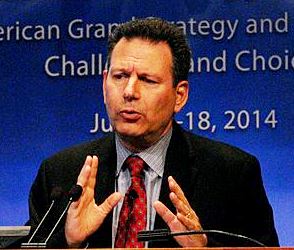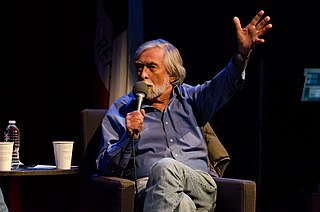A Quote by Robert D. Kaplan
What Americans cant face is that one of the reasons that the Russians and the Chinese were so impressed with us during the Cold War was the fact that Nixon and Kissinger went on bombing despite public reaction.
Related Quotes
Richard Nixon even before becoming president, before meeting Henry Kissinger, he said, "This is ridiculous. Communism is nationalist. The Chinese and Russian and Yugoslav and Cuban and - none of these communists get along, and the Koreans and the Vietnamese, and we can do business with them." And then he opened up to China, and that's when the Cold War started.
For 40 years we were led to think of the Russians as godless, materialistic and an evil empire. When the Cold War ended, we suddenly discovered that Russia was a poor Third World country. They had not been equipped to take over the world. In fact, they were just trying to improve a miserable standard of oppressive living, and couldn't. They had to spend too much on arms build-up. We didn't win the Cold War; we bankrupted the Russians. In effect, it was a big bank exhausting the reserves of a smaller one.
Within days of Richard Nixon's inauguration in January 1969, national-security adviser Kissinger asked the Pentagon to lay out his bombing options in Indochina. The previous president, Lyndon Baines Johnson, had suspended his own bombing campaign against North Vietnam in hopes of negotiating a broader cease-fire.
Charlie Rangel is angry about the Iraq war, the one that Henry Kissinger has told us we can't win. Thanks, Henry, but most Americans figured that out before you did. Rangel saw combat in Korea. Kissinger has only seen combat on TV. That might have something to do with why Kissinger thinks our troops should stay in Iraq even though we can't win.
On April 14, 1986, when the Reagan administration launched an airstrike on Libya in clear violation of international law, Kissinger did the rounds on news shows to justify the bombing. The day after the bombing, Kissinger appeared on ABC's 'Good Morning America' to voice his 'total support.' Attacking Libya, he said, was 'correct' and 'necessary.'
In particular, Kissinger was a key player during a transformative period of the imperial presidency, in the 1960s and '70s, when the Vietnam War undermined the traditional foundations on which it had stood since the early years of the Cold War: elite planning, bipartisan consensus, and public support.
A triumph in which Kissinger could claim to have played some little part, in the presidential elections that November, President Richard Nixon had won the second greatest landslide in American history. Forty-seven million Americans had voted for him - and for his and Kissinger's policies - representing more than 60 percent of all the votes cast.
The only person Henry Kissinger flattered more than President Richard Nixon was Mohammad Reza Pahlavi, the shah of Iran. In the early 1970s, the shah, sitting atop an enormous reserve of increasingly expensive oil and a key figure in Nixon and Kissinger's move into the Middle East, wanted to be dealt with as a serious person.
We thought that the odds of things working OK were up in the upper 90 percent or we wouldn't have gone. But the - there were some problems cropped up on the flight but was able to take care of those OK and - although they were things that we hadn't really trained that much for. But it was the time of the Cold War and so there were was a lot of pressure on the - to get going and the Russians were claiming that they were - Soviets were claiming they were ahead of us in technology.




























